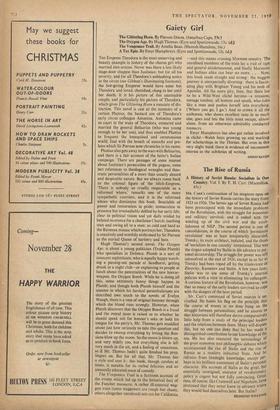Gaiety Girl
THE Empress Theodora is the most unnerving and beastly example in history of the chorus girl who married into ermine. Never was there a less likely stage-door chappie than Justinian; but for all his severity, and for all Theodora's unblushing antics in the circus (see Gibbon's illuminating footnote), the law-giving Emperor would have none but Theodora and loved, cherished, clung to her until her death. It is his picture of this unamiable couple, and particularly his picture of Theodora, which gives The Glittering Horn a measure of dis- tinction. This novel is cast as the memoirs of a certain Photius, the bastard son of Theodora's early circus colleague Antonina. Antonina came to court in the wake of Theodora, ensnared and married the general Belisarius (who was young enough to be her son), and thus enabled Photius to frequent the besequined and ceremonious world, foul with the breath of eunuchs and pre- lates which Sir Pierson now chronicles in his name.
Photius also gets away to the wars with Belisarius, and there is a fair account of the latter's Italian campaign. There are passages of some interest about Justinian's persecution of the pagans, some tart references to theological wrangles and theo- cratic personalities of a more than usually absurd and despicable nature. But we always come back to the colossal figure of the bitch-Empress. 'There is nobody so cruelly respectable as a reformed whore,' remarks one of the more sympathetic courtiers, and it is the reformed whore who dominates this book. Insatiable of power and remorseless in pride; immaculate in presence but irremediably defiled by her early life; clear in political vision and yet daily misled by belated reverence for a charlatan Church; loathing men and owing all to a man; as cold and hard as the Ravenna mosaic which portrays her, Theodora is massively and worthily enthroned by Sir Pierson as the eternal Queen of harlotry and hate.
Hugh Thomas's second novel, The Oxygen Age, is about a young politician (Troilus Plumb) who specialises in Defence. Plumb is a sort of innocent sophisticate, who is equally happy watch- ing a passing-out parade at Sandhurst, getting drunk in a night club—or explaining to people at lunch about the potentialities of the new horror- weapon, the Oxygen Bomb. While he is doing all this, some extremely funny things happen to Plumb; and though both Plumb himself and the manner in which his farcical perambulations are described owe much to the novels of Evelyn Waugh, there is a vein of original humour through which the blood runs strongly. However, when Plumb discovers that the Oxygen Bomb is a fraud and the moral issue is raised as to whether he should speak out for honour's sake or hold his tongue for the party's, Mr. Thomas gets muddled about just how seriously to take this question and decides to swamp everything by letting the Rus- sians blow up the moon. So the moon is blown up, and very wittily too, but everything else is left very much in the air, and a feeling of uneasiness, as if Mr. Thomas hadn't quite finished his prep, lingers on. But for all that, Mr. Thomas has a style and uses it : this book, though careless at times, is notable for its verbal felicities and an unusually educated sense of comedy.
The Vengeance Trail is a fictitious account of the events which led up to the historical fact of the Fancher massacre. A rather ill-assorted wag- gon train (some waggoners are rough but chaste, others altogether unrefined) sets out for California
—and this means crossing Mormon country. The unrefined members of the train lay a trail of rape and general misdemeanour, and finally Mormons and Indians alike can bear no more. . . . Now, this book reads straight and strong : the waggon journey is unexpectedly diverting : there is fascin- ating play with Brigham Young and his mob of Apostles. All the more pity, then, that there has to be a Wild-West cliché heroine—a tiresome, teenage tomboy, all bottom and spunk, who rides like a man and pushes herself into everything. ('Where you go, I go.') And to crown it all the authoress, who shows excellent taste in so much else, goes and lets the little minx escape, almost alone, from an otherwise admirably conducted massacre.
Emyr Humphreys has also got rather involved in cliché—Welsh boys growing up and working for scholarships in the Thirties. But even in this very slight book there is evidence of uncommon interest in the subtleties of writing.
SIMON RAVILN














































































 Previous page
Previous page